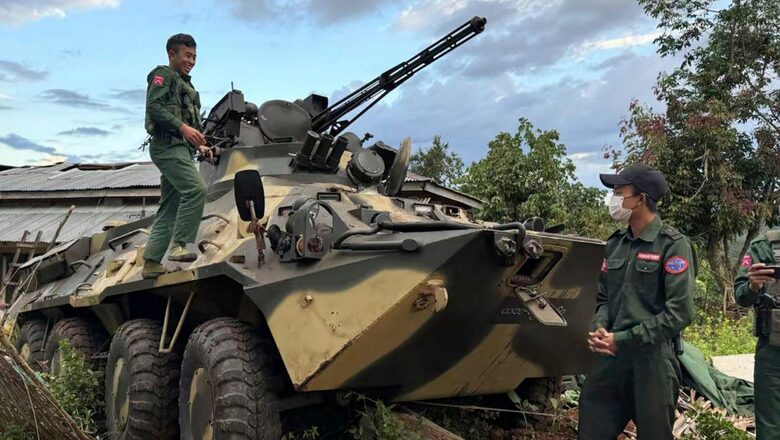
views
Soldiers patrolled the deserted streets of Myanmar’s largest city Thursday, three years after a coup ended a short-lived experiment with democracy and as the embattled junta faces growing challenges to its rule.
Streets and markets in commercial hub Yangon were largely empty, AFP reporters said, as opponents of the military called for people to stay indoors in a “silent strike” against the coup.
In the colonial-era downtown — which once thronged with huge democracy protests — there was a heavy military presence, with soldiers carrying machine guns on patrol and manning checkpoints.
A procession of around 100 monks holding pro-military banners and religious flags passed down one road, stirring the largely quiet atmosphere in the city of 8 million people.
“I feel satisfied to see there are not many people out in the streets,” one office worker in Yangon told AFP.
“It is the proof of our unity against the coup,” she said, requesting anonymity for security reasons.
On the eve of the anniversary of the coup, the junta extended by six months the state of emergency it declared on February 1, 2021 when it rounded up Nobel laureate Aung San Suu Kyi and members of her party.
The military claimed widespread fraud had taken place during polls weeks before when Suu Kyi’s National League for Democracy (NLD) had trounced a military-backed rival in a vote observers had concluded was largely free and fair.
Across the country, huge marches against the coup were met with a brutal and sustained crackdown that sent thousands of protesters seeking ways to fight back.
Three years on, anti-coup “People’s Defence Forces” have enlisted tens of thousands of young recruits and are taking the fight to the junta across swathes of the country.
The junta has torched villages, carried out extrajudicial killings and used air strikes and artillery bombardments to punish communities opposed to its rule, opponents and rights groups say.
In the northern jade and ruby mining hub of Mogok, the scene of recent fighting, the streets were almost deserted on Thursday.
“Some residents left to other towns lately because of fighting. People are scared but still want to show solidarity,” a resident said.
– Bloody quagmire –
Open dissent on the streets of major urban centres has been all but stamped out by the junta, but across swathes of the country the military is struggling to crush PDF groups resisting its rule.
And in late October, an alliance of ethnic minority fighters launched a surprise offensive in northern Shan state, capturing swathes of territory and taking control of lucrative trade routes to China.
A Beijing-brokered peace deal has paused the fighting in the north, but the alliance has largely kept its recent gains and clashes continue elsewhere.
The success of the offensive and the military’s failure to mount a counter-attack has dented morale among low- and mid-level officers, according to several military sources contacted by AFP, all of whom requested anonymity.
On Wednesday, junta chief Min Aung Hlaing, who has been criticised by his supporters over recent battlefield failures, said the military would do “whatever it takes” to crush opposition to its rule.
– ‘Sombre’ –
UN Secretary-General Antonio Guterres called Thursday for an end to violence in Myanmar and a return to democracy on the “sombre anniversary” of the putsch.
More than 4,400 people have been killed in the military’s crackdown on dissent and over 25,000 arrested, according to a local monitoring group.
The junta has also targeted media deemed critical of the coup and subsequent crackdown, revoking licenses and arresting and jailing dozens of journalists.
With 43 journalists languishing behind bars last year, Myanmar was the world’s second-worst jailer of journalists in 2023, according to the Committee to Protect Journalists, behind only China.
Diplomatic efforts to end the conflict led by the United Nations and the Association of Southeast Asian Nations regional bloc have made no headway.



















Comments
0 comment